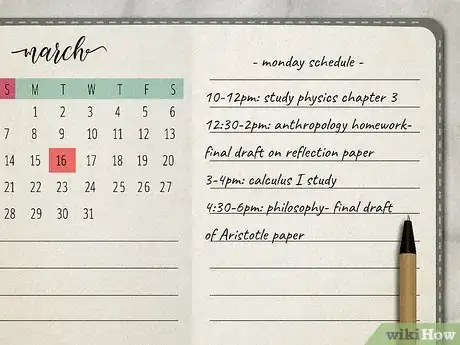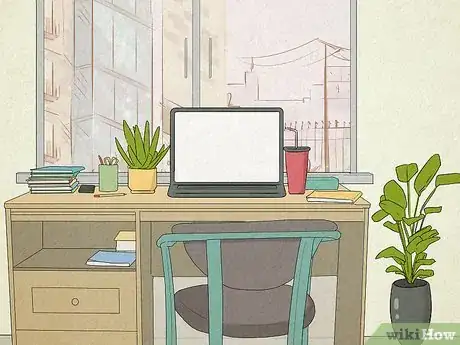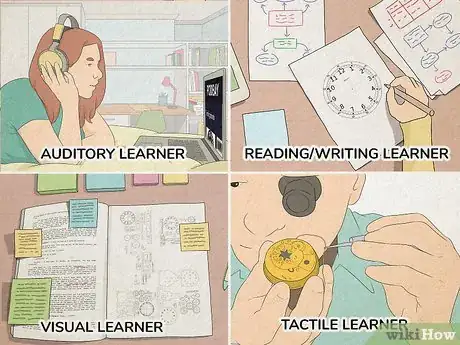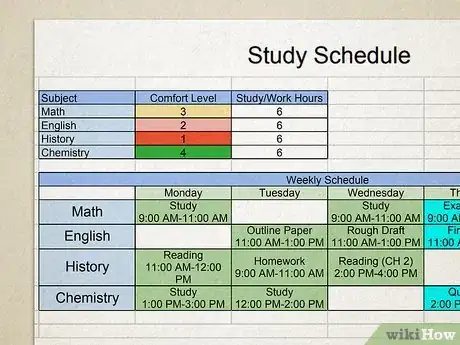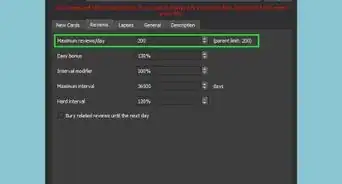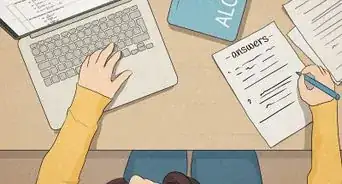This article was co-authored by Alexander Ruiz, M.Ed.. Alexander Ruiz is an Educational Consultant and the Educational Director of Link Educational Institute, a tutoring business based in Claremont, California that provides customizable educational plans, subject and test prep tutoring, and college application consulting. With over a decade and a half of experience in the education industry, Alexander coaches students to increase their self-awareness and emotional intelligence while achieving skills and the goal of achieving skills and higher education. He holds a BA in Psychology from Florida International University and an MA in Education from Georgia Southern University.
This article has been viewed 40,973 times.
When you attempt to remember everything you need learn for a test, you can often confuse yourself. Not only with the content, but finding time to learn it, and understanding how to study it. Keeping track of when, how, and where to study can be a struggle.The ideal that every student should follow a specific, generic set of rules to keep themselves organized tends not to be true. Because everyone is different, there are many different types of learners. Whereas some are able to learn well from a set of study cards or even simply remembering straight from the book, others are not. With some trial and error, you can find a method to learn and keep track of what and where to learn that works for you.
Steps
Developing a Study System
-
1Start over. Write down everything that you did in order to study last time. Write where you studied, what you studied, how much you studied, and how. Consider these to be 'variables' in what is making you unable to get positive results. By learning from your mistakes, you can create a better future.
-
2Create a new schedule. Whether it be a planner, a calendar, a diary-like log, you have to find a way to keep track of what to do. Some prefer planners because of their ability to be carried almost everywhere. Others prefer calendars that can be hung on the walls because of their more organized and easy to read look. Think about what you have to do each day. Not specifically studying, but generic chores that you've learned to do on a daily, weekly, or even monthly basis. It's important to take into consideration everything that consumes extra time in your day.Advertisement
-
3Look at what you've made and change it. You have to learn to edit what you do as you learn. You may use this schedule for a day or two and discover that it doesn't work for you unless you color code what needs to be done for school and what needs to be done for personal reasons. Another option is using stickers that symbolize activities. For example, a soccer ball sticker is the equivalent to a notice reminding you that you have soccer practice. Be flexible and willing to change your schedule. Rome wasn't built in a day, and your schedule won't be, either.
Sticking to Your System
-
1Find a place to study that works for you. It's important to choose an environment that is quiet, comfortable, and a good size. Working in a huge environment with empty space can be incredibly distracting, whereas working in a small area can get claustrophobic and stuffy. Open windows are a good attribute to a study area. Playing music or leaving on the tv can be helpful to some people, however keep in mind that it can get distracting. Switching music, watching the TV, and spacing out in general can all happen when you use electronic devices to 'help' you work.
- Choose a study spot that caters to your learning style. For example, a kinesthetic learner might study in a place where you can walk around and write on a whiteboard.[3]
-
2Find a method to study. This doesn't mean that you should do only your homework-If you're having trouble in a subject, you will surely have to do more than just work off of the classwork. Get some material, whether it be notes or another wikiHow article explaining how to do work, or maybe something else entirely. When you read through your notes, don't feel like you can't mark them. Write questions and tips on the notes. From here, you mainly should just work through trial and error to find the method of studying that works for you. You can allot your own time to the subjects according to the level of difficulty in the subjects.
-
3Adjust to your study schedule. Don't work every second you have allotted to study science. Studying is best done when you work no more than an hour followed by a break lasting no more than 10 minutes. If you feel the need to, change your schedule to consider these breaks by adding extra time studying to each subject.
-
4Stay flexible. Nothing is set in stone, everything can be moved around and edited. Some things won't work for everyone. By changing your schedule and organizational habits, you're also changing your study habits. Those are most important when it comes to school organization, as good study habits result in success in class.
Expert Q&A
-
QuestionHow can I improve my prioritization skills?
 Alexander Ruiz, M.Ed.Alexander Ruiz is an Educational Consultant and the Educational Director of Link Educational Institute, a tutoring business based in Claremont, California that provides customizable educational plans, subject and test prep tutoring, and college application consulting. With over a decade and a half of experience in the education industry, Alexander coaches students to increase their self-awareness and emotional intelligence while achieving skills and the goal of achieving skills and higher education. He holds a BA in Psychology from Florida International University and an MA in Education from Georgia Southern University.
Alexander Ruiz, M.Ed.Alexander Ruiz is an Educational Consultant and the Educational Director of Link Educational Institute, a tutoring business based in Claremont, California that provides customizable educational plans, subject and test prep tutoring, and college application consulting. With over a decade and a half of experience in the education industry, Alexander coaches students to increase their self-awareness and emotional intelligence while achieving skills and the goal of achieving skills and higher education. He holds a BA in Psychology from Florida International University and an MA in Education from Georgia Southern University.
Educational Consultant Try using Steve Covey's "Theory of Prioritization." In this model, he suggests dividing your tasks into 4 categories: urgent and important; non-urgent and important; urgent and not important; and non-urgent and not important.
Try using Steve Covey's "Theory of Prioritization." In this model, he suggests dividing your tasks into 4 categories: urgent and important; non-urgent and important; urgent and not important; and non-urgent and not important. -
QuestionHow can I motivate myself to study?
 Alexander Ruiz, M.Ed.Alexander Ruiz is an Educational Consultant and the Educational Director of Link Educational Institute, a tutoring business based in Claremont, California that provides customizable educational plans, subject and test prep tutoring, and college application consulting. With over a decade and a half of experience in the education industry, Alexander coaches students to increase their self-awareness and emotional intelligence while achieving skills and the goal of achieving skills and higher education. He holds a BA in Psychology from Florida International University and an MA in Education from Georgia Southern University.
Alexander Ruiz, M.Ed.Alexander Ruiz is an Educational Consultant and the Educational Director of Link Educational Institute, a tutoring business based in Claremont, California that provides customizable educational plans, subject and test prep tutoring, and college application consulting. With over a decade and a half of experience in the education industry, Alexander coaches students to increase their self-awareness and emotional intelligence while achieving skills and the goal of achieving skills and higher education. He holds a BA in Psychology from Florida International University and an MA in Education from Georgia Southern University.
Educational Consultant Find a reward and keep yourself honest. Set a goal to get a certain amount of studying—then, reward yourself once you achieve that goal. Don't reward yourself when you've done nothing, though!
Find a reward and keep yourself honest. Set a goal to get a certain amount of studying—then, reward yourself once you achieve that goal. Don't reward yourself when you've done nothing, though! -
QuestionWhere does a visual learner study best?
 Alexander Ruiz, M.Ed.Alexander Ruiz is an Educational Consultant and the Educational Director of Link Educational Institute, a tutoring business based in Claremont, California that provides customizable educational plans, subject and test prep tutoring, and college application consulting. With over a decade and a half of experience in the education industry, Alexander coaches students to increase their self-awareness and emotional intelligence while achieving skills and the goal of achieving skills and higher education. He holds a BA in Psychology from Florida International University and an MA in Education from Georgia Southern University.
Alexander Ruiz, M.Ed.Alexander Ruiz is an Educational Consultant and the Educational Director of Link Educational Institute, a tutoring business based in Claremont, California that provides customizable educational plans, subject and test prep tutoring, and college application consulting. With over a decade and a half of experience in the education industry, Alexander coaches students to increase their self-awareness and emotional intelligence while achieving skills and the goal of achieving skills and higher education. He holds a BA in Psychology from Florida International University and an MA in Education from Georgia Southern University.
Educational Consultant A visual learner will learn and study best in a really colorful, bright, and creative space. They won't be as productive studying in a dull, dimly-lit space.
A visual learner will learn and study best in a really colorful, bright, and creative space. They won't be as productive studying in a dull, dimly-lit space.

